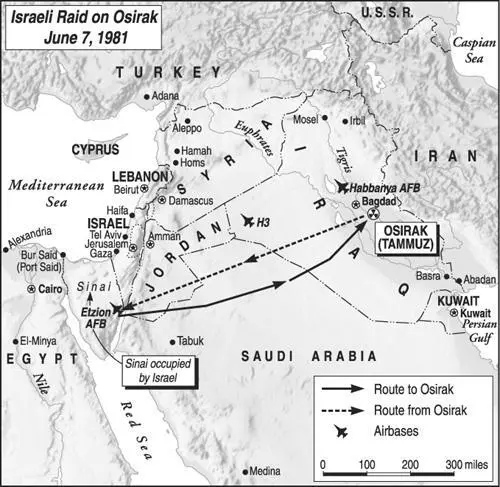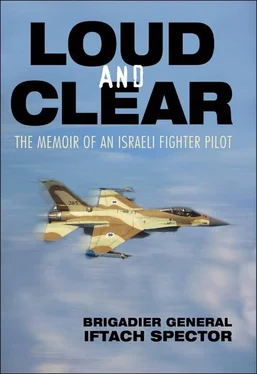“How can one keep calm—”
“One can. You just decide that you won’t get angry, and you don’t.”
After four years of outstanding leadership among his ten comrades in a Cairo prison, Rami definitely knew how to control himself.
AND TRULY, RAMAT-DAVID of 1979 didn’t seem the right place to base a large number of modern fighters. It was an antiquated RAF base that had had repeated face-lifts for decades, and was all patched and speckled with tar barrels, among which the aircraft taxied. The base’s installations were inferior even to Hatzerim’s in the time my Orange Tails were established there, a decade earlier. As in all the other installations we inherited from the Brits, you could find in Ramat-David ultra-modern machines and super technologies functioning inside shacks with patched ceilings.
We all recalled that stormy and rainy night at the end of December 1979 when the brook outside of the northern fence overflowed its banks and flooded the base. This was the surprise from hell. Aircraft revetments were filled with streams of murky water. Fuel tanks floated down slopes like kayaks, jet fighter aircraft were covered with water up to their air intakes, bombs and missiles sank and were lost under layers of mud. Soon the electricity also went out, leaving black winter darkness. Water kept falling from the skies and gushing out of the new river, the pumps died, and the water level rose.
I was then just a visitor in Ramat-David. We had moved there few days before, since I had to assume command the next week. I saw this and understood the meaning of having only seven months to turn this junkyard into a decent place for seventy-five new F-16s. But it was still that night, and I left home and hurried to the operational sector of the base to try to help not as a commander, but as an ordinary pair of hands. With the lights of my car, I found my way to hangar sixteen, where there was only a lone figure, the technical officer, Lt. Dov Bar Or, working in the water with a small tractor trying to drag a Phantom from the underground hangar up to the runway. The hangar was pitch dark like a huge cave, and full of chest-high, muddy water. Closing my eyes, I dived in and felt my way around in the freezing, dirty water. With fumbling fingers I connected the tractor fork to the Phantom’s front wheels, and watched how it began moving through the mud and up to the still-open taxiway.
We did this six times in a row, and the tiny diesel tractor, skidding in the mud, pulled six Phantoms one after another out of the shelter, cruising submerged in the rising water like a submarine, sucking air from the pipe on top, and farting bubbles from its exhaust pipe under water. Even a year later I was still dealing with inquiries and lawsuits over who had been responsible for the loss of expensive equipment and weaponry that night.
In those muddy moments I understood that nothing was free, and it all depended on hard work and covering every aspect of operations and maintenance, from digging to deepen the wadi to feeding the last mechanic trainee; from good absorption of the new F-16s to correct employment of the older squadrons on base, Skyhawks, Phantoms, and Kfirs. Still, creating the conditions for the establishment of three F-16 battle-ready squadrons was the main mission and demanded every bit of experience and good sense I had accumulated in the establishment of the Orange Tails. And indeed I hurried to put my stamp on all the programs Rami left me, and implemented the lessons I had learned from those earlier days.
During those two stormy years 1980 to 1981 I sent nobody to fend for himself and find the materials he needed. My entire base, and through it the whole of the air force, stood behind the three new “children” I was raising. If what they needed was somewhere, my people ran and got it for them. If somebody wasn’t diligent enough, he was gone. Those who thought to use the situation to gain personal power—gone, too. And when things needed were not in existence anywhere, I didn’t forget the contract I had signed with Briar in the Orange Tails—“all clean”—and kept tough and fair. Then at least my subordinates received clear explanations and the commander’s instructions on how to get it done another way, and not just empty promises.
After my experience from the Phantom era I demanded and got mutual cooperation from my new three squadrons. Their commanders were trained to help each other. When after a year one of the three was relocated to a new base in the Negev, her two sister squadrons equipped it with their best men—pilots and technicians—and the base’s best equipment, greased, clean and newly painted. Not a word of envy or complaint was heard.
‡
IN JULY 1980 THE FIRST FOUR aircraft landed, and in less than one year, on June 7, 1981, we attacked Tammuz.
Duby screened on my white wall the gunsight video of the eight F-16s that attacked the nuclear reactor. Square, irrigated fields passed rapidly through the windshield, then roads and high-tension towers. This was the delta of the Euphrates, its looks reminiscent of the Nile delta on the other side. A bend of a river, then Relik’s voice mumbling either to himself or for the pages of history: “It’s all the way we hoped—the SAM batteries are silent, no MiGs.” And then the flight leader, Zeev Raz: “Light ack-ack.”
The sound of rapid breathing filled the speakers, and the windshield revealed an empty sky: the attacking aircraft had just executed a high-G pull-up and was climbing over the Tammuz, readying himself for his dive to the target. An electronic system chirped. Ilan Ramon’s voice muttered: “Yes, some ack-ack,” and then went on, reminding himself in a calm and measured voice, like a student doing his exercises, “afterburner on, deploy chaff.” Lieutenant Ilan Ramon was the kid of the operation, the youngest of us all. The gunsight rolled and a large, square yard appeared, growing fast as the aircraft dove on it. Details became visible, the dirt walls around it, the inside crammed with square structures and narrow alleys. At one side there was a very large building. This was the French nuclear reactor, Osirak—Tammuz itself. It was as large as Madison Square Garden, with a white dome over its center.
The bombsight aligned and began to advance slowly toward the dome. In the distance, the water of the Euphrates River gleamed. A muddy island could be seen in the middle.
And now the bombsight clicked in place, touching the base of the building. A small black dot appeared on the side of the picture, and a short beep indicated that the trigger had been pressed. The small F-16 trembled as two tons of iron and explosives—a fifth of its own weight—leaped free to speed to the target. And again the measured voice went through proper procedure, “Afterburner off.”
“Cluster,” demanded Nahumi of his three following aircraft, “sound off.”

“Two,” I answered him. I was out, following him east.
“Three.” That was Relik.
Silence.
“Cluster four?” and again, now in a harsher voice: “Cluster four, come in!”
We all breathed a sigh of relief when at last young Ilan Ramon, Cluster Four, finished his postattack checks and got around to answering, “Four here.”
Now the operation commander, Zeevik Raz, could confirm to the relay man, Sela, and through him to the chief commander: “Charlie all.”
We came out fast, leaving the cultivated delta behind, and again we were over the desert. It was time to go for some altitude—we still had a thousand kilometers to go. Lighter now, but low on fuel, we climbed to thirty-three thousand feet. Six F-15 air-to-air fighters were waiting for us, to escort us on the long way home. We had carried two tons each all the way to Baghdad, and now we had no fuel left to take on any enemy fighters on the ninety-minute flight back to Israel. We finally landed with minimum fuel, but safe. Ramon’s complicated calculations proved out; he had brains, the kid.
Читать дальше













